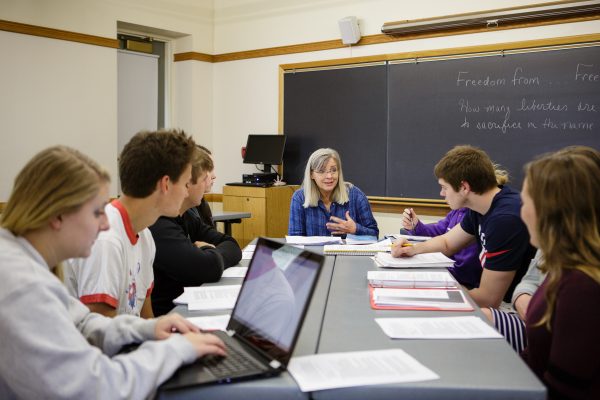Cornell College’s work to rethink and reform the core education curriculum just received financial support through a second Andrew W. Mellon Foundation grant for $200,000.
Last spring, the foundation awarded Cornell a $50,000 planning grant. Now that the prep work is done, this new funding will pave the way for phase II of the project. “This generous support from The Andrew W. Mellon Foundation will help Cornell to reimagine the core curriculum and put new ideas into practice,” said Vice President for Academic Affairs and Dean of the College Joe Dieker. “This major rejuvenation of the core curriculum has components that span each year of study and will ensure we’re meeting the needs of our students as they prepare for life beyond Cornell College.”
While Cornell’s core curriculum has had minor modifications over the years, this is a more transformative change. Phase II consists of four pilot projects, which will unfold over the next two academic years.
“This generous support from The Andrew W. Mellon Foundation will help Cornell to reimagine the core curriculum and put new ideas into practice,” said Vice President for Academic Affairs and Dean of the College Joe Dieker. “This major rejuvenation of the core curriculum has components that span each year of study and will ensure we’re meeting the needs of our students as they prepare for life beyond Cornell College.”
While Cornell’s core curriculum has had minor modifications over the years, this is a more transformative change. Phase II consists of four pilot projects, which will unfold over the next two academic years.
- Common First-Year Seminar (fall 2018 and fall 2019)
- For years, Cornell has had first-year seminars during the first block. This pilot project tests offering one common course and materials, as research indicates that is more effective in transitioning new students into the study of the liberal arts and can build community.
- First-Year Student Success Program (fall 2018 and fall 2019)
- Throughout the first three blocks of a student’s inaugural year at Cornell, Student Success Instructors and Peer Mentors will work with students to focus on time-management, campus involvement, civil discourse, intercultural literacy, academic planning, future opportunities, and personal well-being to ensure their success.
- Learning through Practice (academic years 2018-19 and 2019-20)
- Faculty or staff will work with students for this experiential learning pilot program. Students will take on projects that span a block, semester, or year and can include academic research, civic engagement, creative expression, global connections, leadership, or professional exploration.
- E-Portfolio (begins fall of 2019)
- This will encourage students to set learning goals, celebrate progress, adjust learning strategies, and take ownership of their unique path.
This curriculum redesign was recommended by Dean Dieker in December 2016, after several years spent focused on developing new major programs at the college. Since 2014, Cornell has added new programs in engineering, behavioral neuroscience, business, management, and musical theatre.
Cornell hopes to fully implement its new core education curriculum during the fall of 2020. Over the next two years, work will continue to develop and build support for the final curricular model.
 “This generous support from The Andrew W. Mellon Foundation will help Cornell to reimagine the core curriculum and put new ideas into practice,” said Vice President for Academic Affairs and Dean of the College Joe Dieker. “This major rejuvenation of the core curriculum has components that span each year of study and will ensure we’re meeting the needs of our students as they prepare for life beyond Cornell College.”
While Cornell’s core curriculum has had minor modifications over the years, this is a more transformative change. Phase II consists of four pilot projects, which will unfold over the next two academic years.
“This generous support from The Andrew W. Mellon Foundation will help Cornell to reimagine the core curriculum and put new ideas into practice,” said Vice President for Academic Affairs and Dean of the College Joe Dieker. “This major rejuvenation of the core curriculum has components that span each year of study and will ensure we’re meeting the needs of our students as they prepare for life beyond Cornell College.”
While Cornell’s core curriculum has had minor modifications over the years, this is a more transformative change. Phase II consists of four pilot projects, which will unfold over the next two academic years.